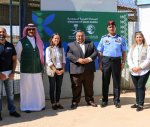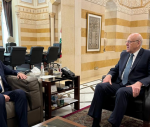You are here
Forum issues policy paper, calls for more emphasis on human capital
By Ana V. Ibáñez Prieto - Nov 13,2018 - Last updated at Nov 13,2018
AMMAN — “Human capital must be made a priority in the Kingdom,” the Jordan Strategy Forum (JSF) said on Sunday, stressing the need to take measures in light of the “limited natural resources in Jordan, and the rapid technological developments of the so called Fourth Industrial Revolution”.
The statement came in a policy paper recently issued by the forum, which analysed Jordan’s position on the World Bank's Human Capital Index 2018 and set out a series of recommendations for the health and education sectors.
Every year, the World Bank's Human Capital Index assesses the status of over 100 countries in terms of the level of health and education the average citizen can expect to enjoy by the age of 18, assigning each country a score ranging from zero to one.
With a score of 0.56, Jordan ranked 79 out of 157 countries in this year’s edition of the index, stepping ahead of Arab countries such as Lebanon, Egypt, Algeria and Morocco.
“Human capital represents an opportunity for Jordan in light of its modest natural capital, and an important resource under the leadership of the technological and software industries,” the forum’s analysis said, stressing that according to the index, a misuse of the Kingdom’s human capital would result in a 44 per cent loss of potential national income.
“We [JSF] see building human capital as the key for the future of Jordan,” JSF CEO Ibrahim Saif told The Jordan Times, stressing the need to “utilise our resources in health and education in order to maximise benefits, and to focus on the areas that would enhance the competitiveness of the Kingdom’s economy in the long run”.
Human capital was deemed as “Jordan’s most precious resource” by HRH Prince Hassan in April this year at the conclusion of the EU-funded Civil Society project, which was carried out by the West Asia-North Africa Institute and the National Centre for Human Rights under the patronage of the prince.
“It is high time we divide the responsibilities between the public sector, private sector and civil society equally. It is time for Jordan to focus on empowering its youth, women and refugee population,” Prince Hassan said at the event, voicing his appreciation to the donors and international agencies for their support of Jordan’s civil society.
Concerning education, JSF’s paper highlighted the need to “move gradually from vertical teaching methods to horizontal learning based methods so that the curiosity of the students is what triggers them to learn”, calling on the Ministry of Education to set up partnerships with civil society organisations and the private sector to develop non-elective, voluntary activities for students focused on the fields of their interest.
In this regard, the paper highlighted the educational practices of Finland and Japan as an example for Jordan to follow, elaborating on how the countries “moved from traditional education methods to open learning techniques that provided students with more room for reflection, criticism and innovation”.
In addition, the forum stressed the need to prioritise the development of students' technological skills, with a special focus on those that “represent the requirements of the coming era”, citing examples such as the various programming languages and artificial intelligence.
During a meeting held in September to follow up on the implementation of the 2016-2025 National Strategy for Human Resources Development, His Majesty King Abdullah confirmed that “citizens should see real progress in the education services in a way that eases the economic burden”, stressing the need to “expedite plans to reform the technical and vocational training sector to provide youth with skills demanded in the labour market”.
“In addition, information technology should be employed as soon as possible in various education programmes,” the King said.
Prime Minister Omar Razzaz outlined the strategy’s key goals achieved so far, indicating that 35 per cent of the projects designed for this purpose had already been implemented.
The premier also pointed out that the National Centre for Curricula Development is working at full capacity, developing new maths and science syllabi in cooperation with local experts according to international standards. He also noted that new schools have been built to accommodate the increasing number of students and that teachers have been trained in up-in-date teaching methods.
Concerning the health sector, the forum noted the need to improve the public health services provided to citizens through the development of government hospitals, the provision of required competencies and the monitoring of public health expenditures.
In addition, JSF recommended that the government raise awareness on health problems of all kinds and foster citizens’ engagement with sports, pointing out that this would contribute to the overall physical and mental health of Jordanians and thus reflect on their productivity.
Related Articles
AMMAN — Jordan has ranked 98th among 193 countries on the UN’s 2018 E-Government Development Index, according to a Jordan Strategy Forum (JS
AMMAN — The Jordan Strategy Forum (JSF), in a policy brief, has called on all relevant stakeholders to look into the political and economic
AMMAN — The Jordan Strategy Forum (JSF) has issued a paper titled "Commitment indicator to reducing inequality: Encouraging results for 2022
















